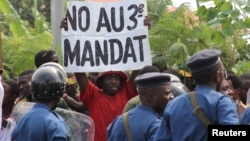Burundi's constitutional court has ruled that President Pierre Nkurunziza is allowed to run for a third term.
The decision, announced Tuesday, appeared unlikely to end running street protests against the president's bid to extend his rule, which critics say would violate the constitution.
The court's deputy president has rejected the ruling and fled to neighboring Rwanda. Sylvere Nimpagaritse told reporters that his conscience would not allow him to sign a ruling that is unconstitutional.
Meanwhile, protests continued in the capital, Bujumbura. A day earlier, protesters clashed with police, who opened fire and killed three people. Police say one of the protesters had thrown a grenade. Dozens of people, including police officers, were injured in the unrest.
Vice President Prosper Bazombanza said the government is willing to release the hundreds of detained protesters on the condition that the protests stop.
At least 12 people have died since the protests began April 26, the day Nkurunziza announced he would seek re-election in the June 26 poll.
In Tuesday's ruling, the court said the president could run without violating the constitution's two-term limit, saying "renewal of the presidential term through direct universal suffrage" is permitted.
Nkurunziza's first term as president was the result of a parliamentary vote. The president's supporters say he has served only one term as a result of winning a general election and should be eligible to seek re-election according to those terms.
The unrest has prompted at least 24,000 Burundians to flee to Rwanda and sparked fears of a renewed civil war in Burundi. An estimated 300,000 people were killed in a 13-year conflict that ended in 2006.
Speaking in Kenya on Monday, U.S. Secretary of State John Kerry said the United States is "deeply concerned" about the Burundian president's decision, which he said "flies directly in the face of the constitution."





